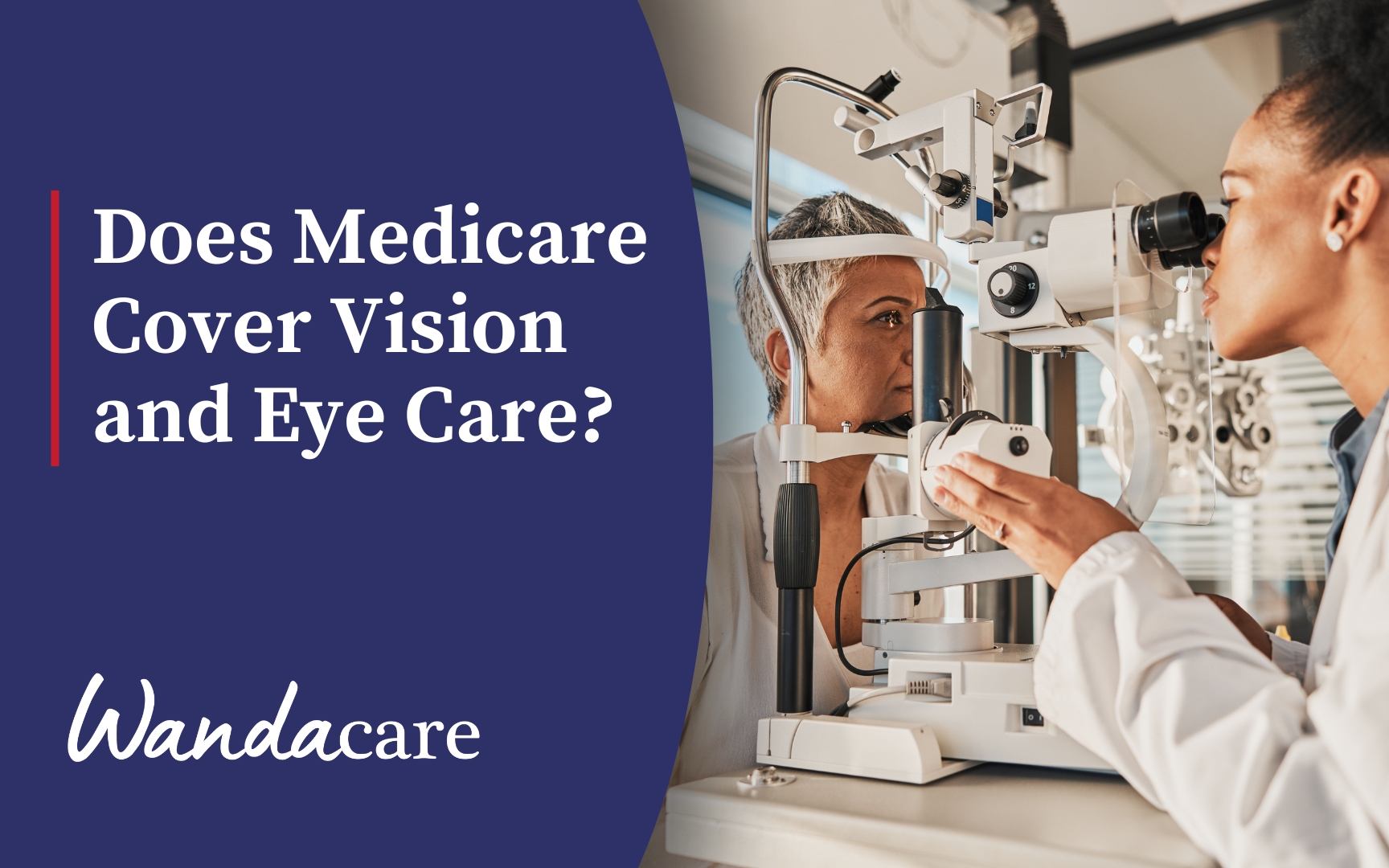Wandacare’s team of knowledgeable Medicare Advisors is here to assist you with all your Medicare coverage needs. That includes your options for vision and eye care coverage.
In this blog, we’ll walk you through Medicare’s coverage for eye care and the type of plans that include vision benefits.
Medicare and Vision: What You Need to Know
Original Medicare does not provide coverage for vision services. The federally funded and managed Original Medicare only provides Part A hospitalization and Part B medical coverage. If you elect Original Medicare for your coverage, you can buy a stand-alone vision plan from a private insurer. The process is similar to how you buy a Part D prescription drug plan, but unlike Part D prescription drug plans, there are no Medicare vision plans with set costs, supplements, or reimbursement from Medicare.
If you find yourself needing to buy additional plans to get the vision benefits coverage you want, you may want to consider a Medicare Advantage Plan over Original Medicare. Medicare Advantage Plans, also known as Medicare Part C, are offered and managed by private insurance companies approved by Medicare, which pays the insurance company to cover your Medicare benefits with your healthcare services coordinated through the Medicare Advantage Plan.
Medicare Advantage Plans provide Part A and B coverage, but usually also include prescription drug coverage (Medicare Part D), as well as additional benefits like vision plans and dental coverage. In fact, 99% of individuals enrolled in Medicare Advantage have plans that include vision coverage.
Addressing Common Questions About Medicare and Eye Care
If you have a chronic eye condition, disease or condition that can affect your vision and eye health, Medicare Part B generally provides coverage of exams and treatments. If you’re looking for coverage for routine eye care, like annual eye exams and glasses, Medicare Advantage Plans include coverage for these additional vision benefits.
Let’s look at some of the most common vision benefits and eye care needs and which “parts” of Medicare provide coverage:
Does Medicare Cover Glasses and Contact Lenses?
No, Original Medicare (Part A and Part B) does not cover glasses or contact lenses for vision correction. However, Medicare Part B does provide coverage for one pair of eyeglasses or contact lenses due to cataract surgery with an intraocular lens implant. Many Medicare Advantage Plans (Part C) offer vision coverage for eye exams, glasses, and related services as part of their additional benefits. If you need vision coverage for glasses, you’ll want to consider Medicare Part C and compare individual Medicare Advantage Plans for their specific benefits and coverage options.
Does Medicare Cover Eye Exams?
No, Original Medicare (Part A and Part B) does not cover routine eye exams for vision correction. However, Medicare Part B does cover eye exams related to specific conditions, including glaucoma, macular degeneration, and diabetic retinopathy. Many Medicare Advantage Plans (Part C) offer vision coverage for eye exams, glasses, and related services as part of their additional benefits. If you need vision coverage, you’ll want to consider Medicare Part C and compare individual Medicare Advantage Plans for their specific benefits and coverage options.
Does Medicare Cover Eye Conditions and Vision Surgery?
Medicare covers certain types of eye conditions and diseases and medically necessary treatments, including eye surgery. Most of these treatments will be covered under Medicare Part B (diagnostic exams, doctor visits, outpatient procedures) with Medicare covering 80% of costs and you responsible for 20% of the Medicare-approved amount after meeting the yearly Part B deductible.
Prescription medications and treatments (e.g. eye drops, injections, etc.) will be covered under your Medicare Part D prescription drug coverage, which is included with a Medicare Advantage Plan or purchased separately and added to Original Medicare. Coverage and your costs depend on your Part D plans’ formulary list of drugs covered and at what tier.
The most common eye care and vision surgeries covered by Medicare include:
- Cataract Surgery: Medicare Part B covers cataract surgery, including intraocular lenses (IOLs), as well as one pair of eyeglasses or contact lenses needed due to the surgery.
- Glaucoma: If you are deemed high-risk for developing glaucoma (due to diabetes, family history, or based on race/ethnicity), Medicare Part B fully covers one eye exam every 12 months to screen for glaucoma. Based on these screenings and/or progression of the disease, Medicare then covers medically necessary treatments, such as eye drops, laser therapy, or surgery.
- Diabetic Retinopathy: Like the covered yearly screening for glaucoma, Medicare covers annual eye exams for diabetic patients to check for and monitor diabetes-related vision issues, such as diabetic retinopathy. Medicare then covers any medically necessary treatments, including eye injections, laser surgery, or other prescribed medications.
- Macular Degeneration Treatment: Medicare typically covers eye exams to diagnose potential vision problems, like age-related macular degeneration. If diagnosed, follow-up monitoring and therapies are then covered. Medicare covers certain injectable medications (e.g., anti-VEGF drugs like Avastin or Lucentis) and laser therapy.
- Other Retinal Disorders and Medically Necessary Eye Surgeries: Medicare will typically cover injections, diagnostic imaging, and surgeries related to injuries, abnormalities, diseases, or conditions of the eye, such as retinal detachment or vein occlusion, if they are necessary to maintain or restore vision or address a medical condition. Medicare may cover certain treatments for dry eye disease if deemed medically necessary, such as tear duct plugs or prescription medications like Restasis.
Corrective vision surgeries, like LASIK or PRK, are considered elective procedures and not covered by Medicare.
Let Wandacare Help You with Your Vision Coverage
Ready to explore your eye care and vision options? The Wandacare Team can help you understand Medicare’s eye care coverage based on your unique medical needs and eligibility. We can help you determine if Original Medicare or Medicare Advantage is the best option for you. We can also compare Medicare Advantage Plans to ensure you’re getting the vision coverage and benefits you want at the best price.
Our licensed Florida agents are ready to pair you with your perfect plan!




